Transition to Professional Nursing Report 2022
VerifiedAdded on 2022/10/04
|8
|2013
|31
AI Summary
Contribute Materials
Your contribution can guide someone’s learning journey. Share your
documents today.
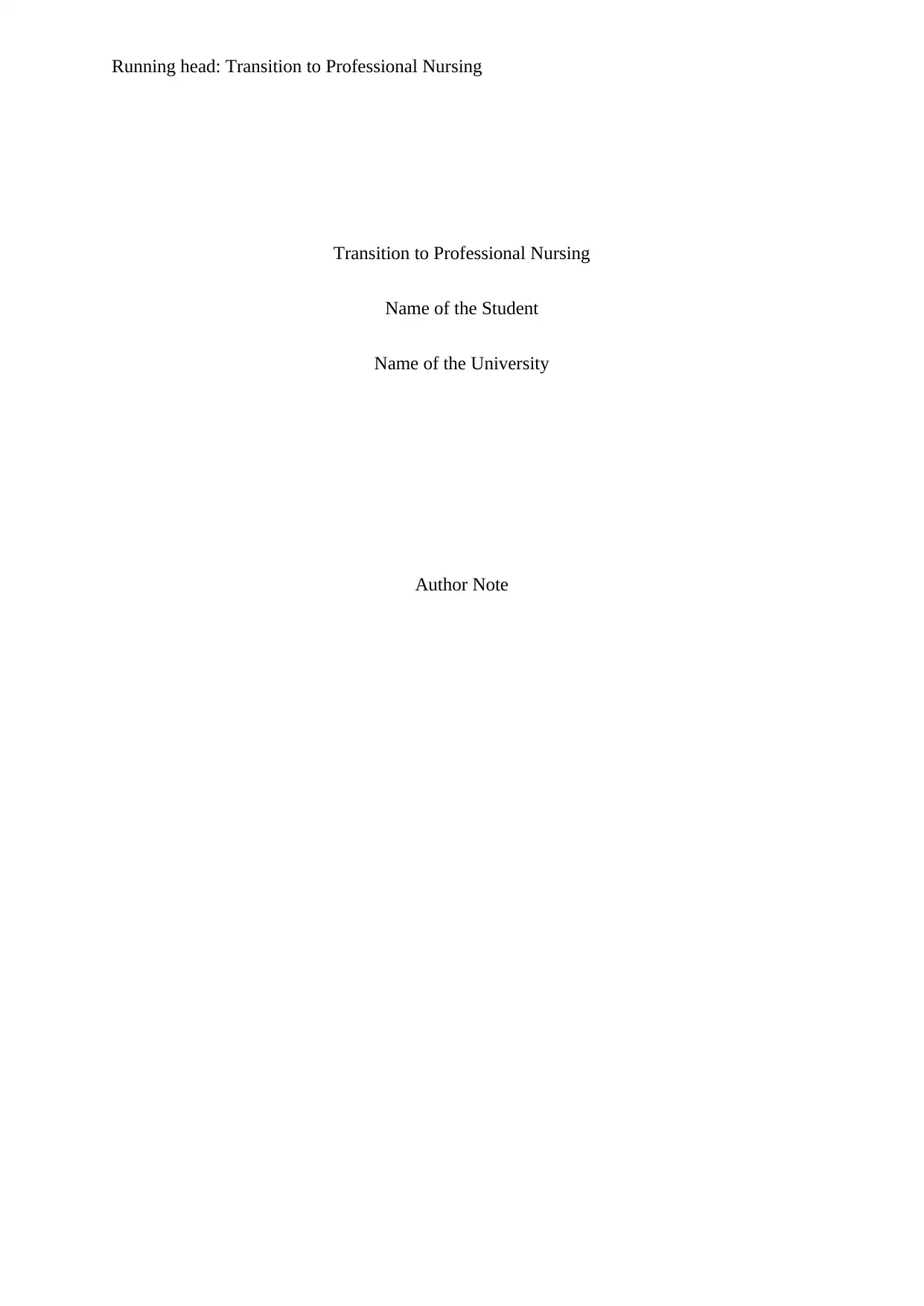
Running head: Transition to Professional Nursing
Transition to Professional Nursing
Name of the Student
Name of the University
Author Note
Transition to Professional Nursing
Name of the Student
Name of the University
Author Note
Secure Best Marks with AI Grader
Need help grading? Try our AI Grader for instant feedback on your assignments.
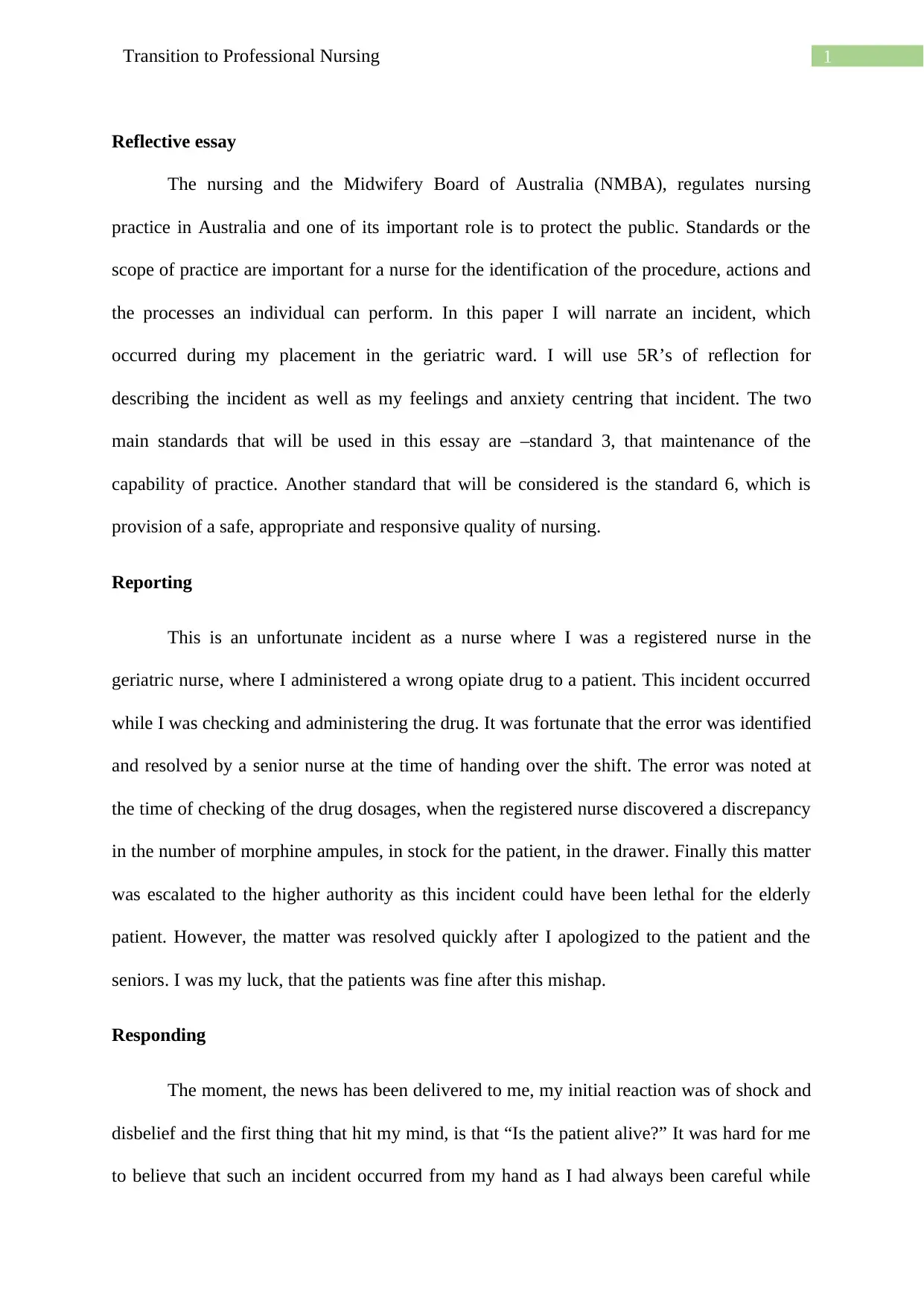
1Transition to Professional Nursing
Reflective essay
The nursing and the Midwifery Board of Australia (NMBA), regulates nursing
practice in Australia and one of its important role is to protect the public. Standards or the
scope of practice are important for a nurse for the identification of the procedure, actions and
the processes an individual can perform. In this paper I will narrate an incident, which
occurred during my placement in the geriatric ward. I will use 5R’s of reflection for
describing the incident as well as my feelings and anxiety centring that incident. The two
main standards that will be used in this essay are –standard 3, that maintenance of the
capability of practice. Another standard that will be considered is the standard 6, which is
provision of a safe, appropriate and responsive quality of nursing.
Reporting
This is an unfortunate incident as a nurse where I was a registered nurse in the
geriatric nurse, where I administered a wrong opiate drug to a patient. This incident occurred
while I was checking and administering the drug. It was fortunate that the error was identified
and resolved by a senior nurse at the time of handing over the shift. The error was noted at
the time of checking of the drug dosages, when the registered nurse discovered a discrepancy
in the number of morphine ampules, in stock for the patient, in the drawer. Finally this matter
was escalated to the higher authority as this incident could have been lethal for the elderly
patient. However, the matter was resolved quickly after I apologized to the patient and the
seniors. I was my luck, that the patients was fine after this mishap.
Responding
The moment, the news has been delivered to me, my initial reaction was of shock and
disbelief and the first thing that hit my mind, is that “Is the patient alive?” It was hard for me
to believe that such an incident occurred from my hand as I had always been careful while
Reflective essay
The nursing and the Midwifery Board of Australia (NMBA), regulates nursing
practice in Australia and one of its important role is to protect the public. Standards or the
scope of practice are important for a nurse for the identification of the procedure, actions and
the processes an individual can perform. In this paper I will narrate an incident, which
occurred during my placement in the geriatric ward. I will use 5R’s of reflection for
describing the incident as well as my feelings and anxiety centring that incident. The two
main standards that will be used in this essay are –standard 3, that maintenance of the
capability of practice. Another standard that will be considered is the standard 6, which is
provision of a safe, appropriate and responsive quality of nursing.
Reporting
This is an unfortunate incident as a nurse where I was a registered nurse in the
geriatric nurse, where I administered a wrong opiate drug to a patient. This incident occurred
while I was checking and administering the drug. It was fortunate that the error was identified
and resolved by a senior nurse at the time of handing over the shift. The error was noted at
the time of checking of the drug dosages, when the registered nurse discovered a discrepancy
in the number of morphine ampules, in stock for the patient, in the drawer. Finally this matter
was escalated to the higher authority as this incident could have been lethal for the elderly
patient. However, the matter was resolved quickly after I apologized to the patient and the
seniors. I was my luck, that the patients was fine after this mishap.
Responding
The moment, the news has been delivered to me, my initial reaction was of shock and
disbelief and the first thing that hit my mind, is that “Is the patient alive?” It was hard for me
to believe that such an incident occurred from my hand as I had always been careful while
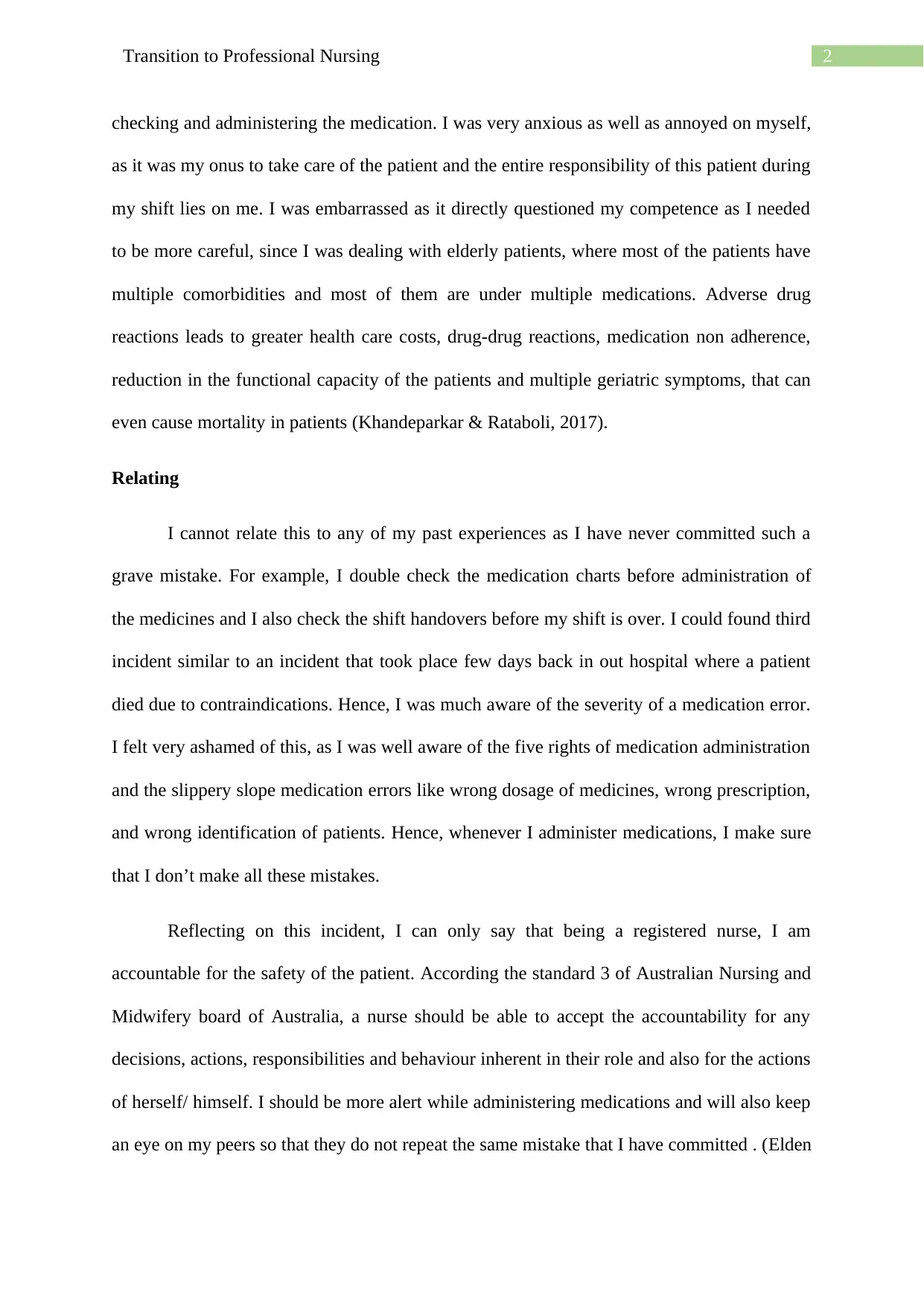
2Transition to Professional Nursing
checking and administering the medication. I was very anxious as well as annoyed on myself,
as it was my onus to take care of the patient and the entire responsibility of this patient during
my shift lies on me. I was embarrassed as it directly questioned my competence as I needed
to be more careful, since I was dealing with elderly patients, where most of the patients have
multiple comorbidities and most of them are under multiple medications. Adverse drug
reactions leads to greater health care costs, drug-drug reactions, medication non adherence,
reduction in the functional capacity of the patients and multiple geriatric symptoms, that can
even cause mortality in patients (Khandeparkar & Rataboli, 2017).
Relating
I cannot relate this to any of my past experiences as I have never committed such a
grave mistake. For example, I double check the medication charts before administration of
the medicines and I also check the shift handovers before my shift is over. I could found third
incident similar to an incident that took place few days back in out hospital where a patient
died due to contraindications. Hence, I was much aware of the severity of a medication error.
I felt very ashamed of this, as I was well aware of the five rights of medication administration
and the slippery slope medication errors like wrong dosage of medicines, wrong prescription,
and wrong identification of patients. Hence, whenever I administer medications, I make sure
that I don’t make all these mistakes.
Reflecting on this incident, I can only say that being a registered nurse, I am
accountable for the safety of the patient. According the standard 3 of Australian Nursing and
Midwifery board of Australia, a nurse should be able to accept the accountability for any
decisions, actions, responsibilities and behaviour inherent in their role and also for the actions
of herself/ himself. I should be more alert while administering medications and will also keep
an eye on my peers so that they do not repeat the same mistake that I have committed . (Elden
checking and administering the medication. I was very anxious as well as annoyed on myself,
as it was my onus to take care of the patient and the entire responsibility of this patient during
my shift lies on me. I was embarrassed as it directly questioned my competence as I needed
to be more careful, since I was dealing with elderly patients, where most of the patients have
multiple comorbidities and most of them are under multiple medications. Adverse drug
reactions leads to greater health care costs, drug-drug reactions, medication non adherence,
reduction in the functional capacity of the patients and multiple geriatric symptoms, that can
even cause mortality in patients (Khandeparkar & Rataboli, 2017).
Relating
I cannot relate this to any of my past experiences as I have never committed such a
grave mistake. For example, I double check the medication charts before administration of
the medicines and I also check the shift handovers before my shift is over. I could found third
incident similar to an incident that took place few days back in out hospital where a patient
died due to contraindications. Hence, I was much aware of the severity of a medication error.
I felt very ashamed of this, as I was well aware of the five rights of medication administration
and the slippery slope medication errors like wrong dosage of medicines, wrong prescription,
and wrong identification of patients. Hence, whenever I administer medications, I make sure
that I don’t make all these mistakes.
Reflecting on this incident, I can only say that being a registered nurse, I am
accountable for the safety of the patient. According the standard 3 of Australian Nursing and
Midwifery board of Australia, a nurse should be able to accept the accountability for any
decisions, actions, responsibilities and behaviour inherent in their role and also for the actions
of herself/ himself. I should be more alert while administering medications and will also keep
an eye on my peers so that they do not repeat the same mistake that I have committed . (Elden
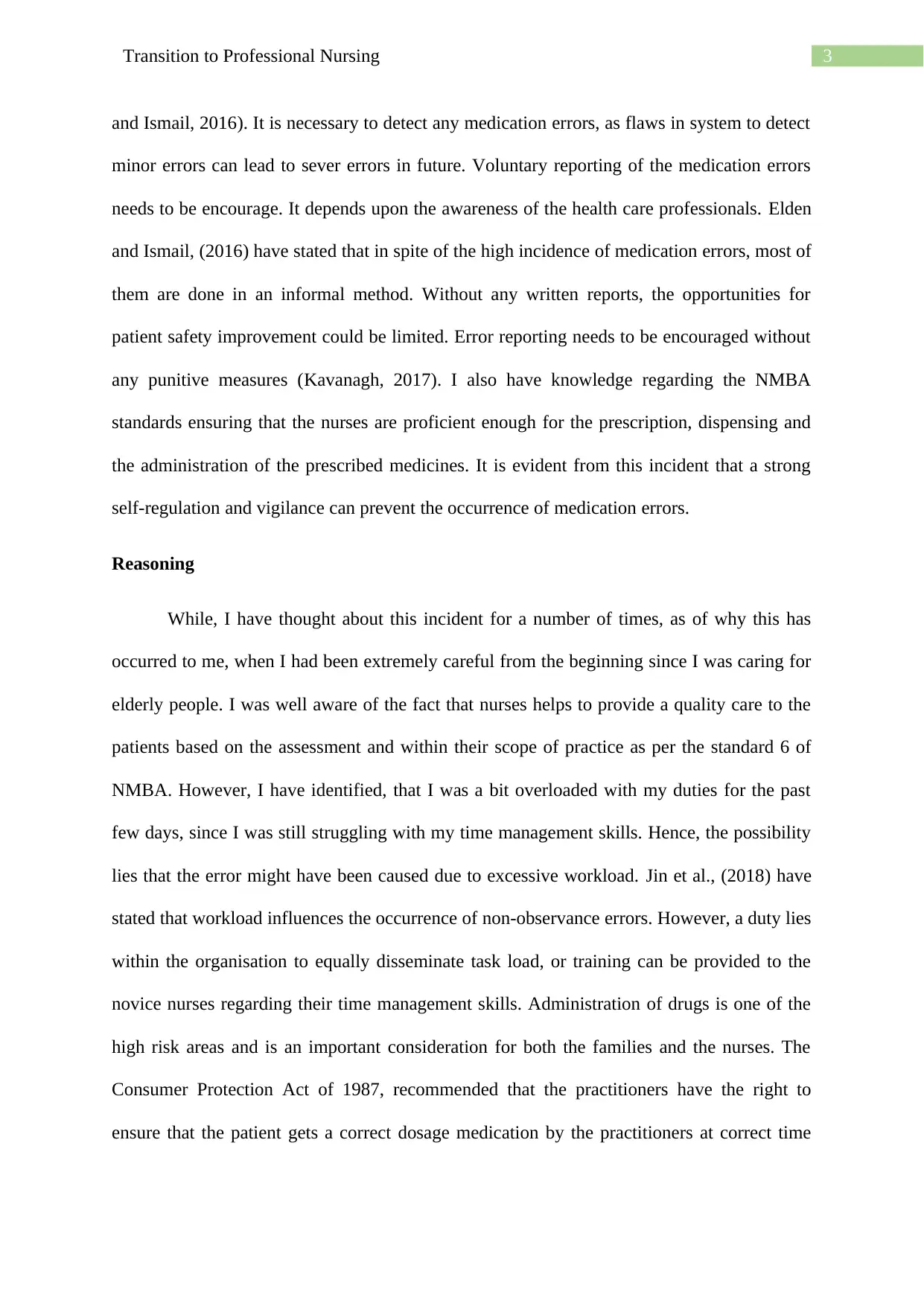
3Transition to Professional Nursing
and Ismail, 2016). It is necessary to detect any medication errors, as flaws in system to detect
minor errors can lead to sever errors in future. Voluntary reporting of the medication errors
needs to be encourage. It depends upon the awareness of the health care professionals. Elden
and Ismail, (2016) have stated that in spite of the high incidence of medication errors, most of
them are done in an informal method. Without any written reports, the opportunities for
patient safety improvement could be limited. Error reporting needs to be encouraged without
any punitive measures (Kavanagh, 2017). I also have knowledge regarding the NMBA
standards ensuring that the nurses are proficient enough for the prescription, dispensing and
the administration of the prescribed medicines. It is evident from this incident that a strong
self-regulation and vigilance can prevent the occurrence of medication errors.
Reasoning
While, I have thought about this incident for a number of times, as of why this has
occurred to me, when I had been extremely careful from the beginning since I was caring for
elderly people. I was well aware of the fact that nurses helps to provide a quality care to the
patients based on the assessment and within their scope of practice as per the standard 6 of
NMBA. However, I have identified, that I was a bit overloaded with my duties for the past
few days, since I was still struggling with my time management skills. Hence, the possibility
lies that the error might have been caused due to excessive workload. Jin et al., (2018) have
stated that workload influences the occurrence of non-observance errors. However, a duty lies
within the organisation to equally disseminate task load, or training can be provided to the
novice nurses regarding their time management skills. Administration of drugs is one of the
high risk areas and is an important consideration for both the families and the nurses. The
Consumer Protection Act of 1987, recommended that the practitioners have the right to
ensure that the patient gets a correct dosage medication by the practitioners at correct time
and Ismail, 2016). It is necessary to detect any medication errors, as flaws in system to detect
minor errors can lead to sever errors in future. Voluntary reporting of the medication errors
needs to be encourage. It depends upon the awareness of the health care professionals. Elden
and Ismail, (2016) have stated that in spite of the high incidence of medication errors, most of
them are done in an informal method. Without any written reports, the opportunities for
patient safety improvement could be limited. Error reporting needs to be encouraged without
any punitive measures (Kavanagh, 2017). I also have knowledge regarding the NMBA
standards ensuring that the nurses are proficient enough for the prescription, dispensing and
the administration of the prescribed medicines. It is evident from this incident that a strong
self-regulation and vigilance can prevent the occurrence of medication errors.
Reasoning
While, I have thought about this incident for a number of times, as of why this has
occurred to me, when I had been extremely careful from the beginning since I was caring for
elderly people. I was well aware of the fact that nurses helps to provide a quality care to the
patients based on the assessment and within their scope of practice as per the standard 6 of
NMBA. However, I have identified, that I was a bit overloaded with my duties for the past
few days, since I was still struggling with my time management skills. Hence, the possibility
lies that the error might have been caused due to excessive workload. Jin et al., (2018) have
stated that workload influences the occurrence of non-observance errors. However, a duty lies
within the organisation to equally disseminate task load, or training can be provided to the
novice nurses regarding their time management skills. Administration of drugs is one of the
high risk areas and is an important consideration for both the families and the nurses. The
Consumer Protection Act of 1987, recommended that the practitioners have the right to
ensure that the patient gets a correct dosage medication by the practitioners at correct time
Secure Best Marks with AI Grader
Need help grading? Try our AI Grader for instant feedback on your assignments.
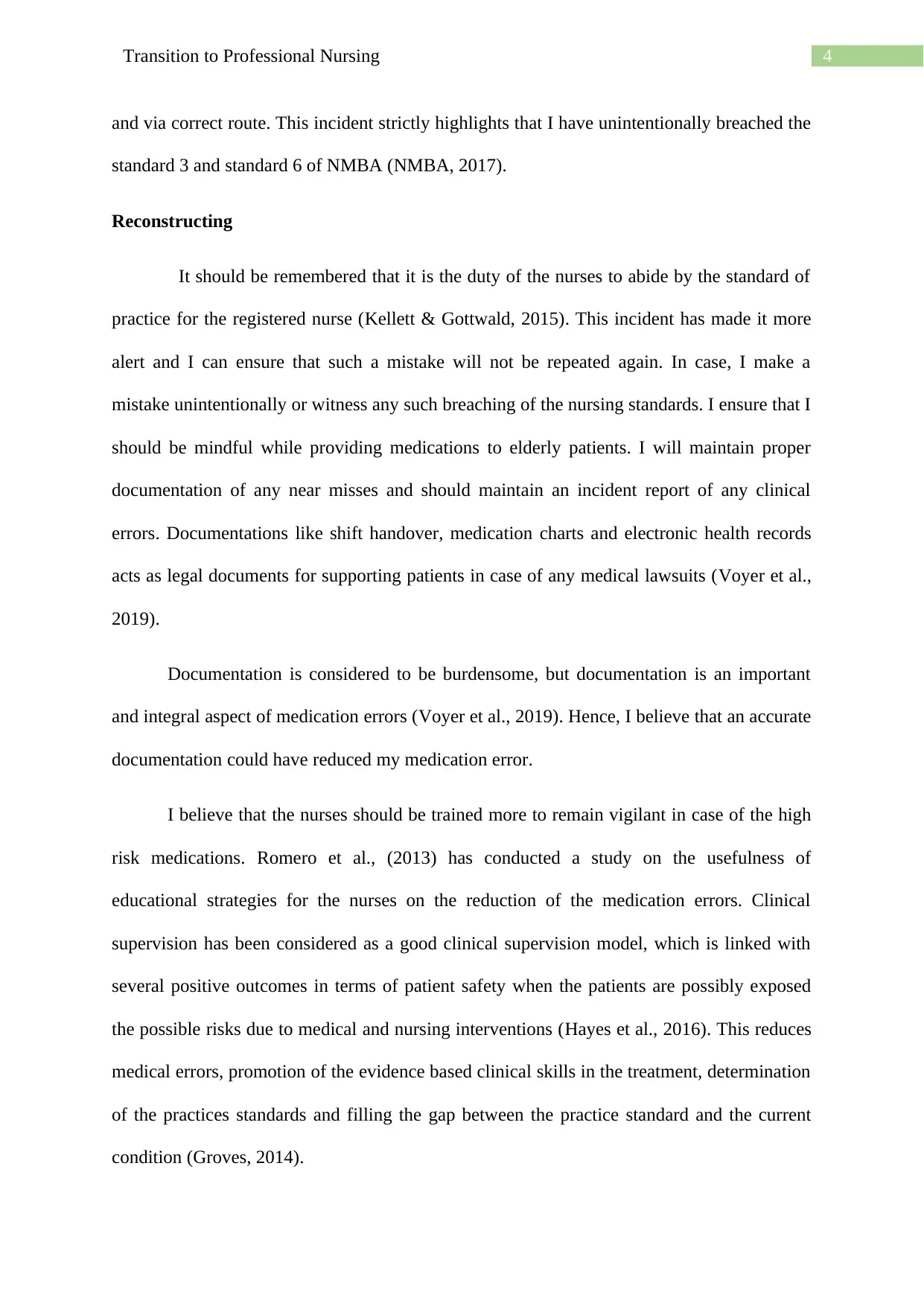
4Transition to Professional Nursing
and via correct route. This incident strictly highlights that I have unintentionally breached the
standard 3 and standard 6 of NMBA (NMBA, 2017).
Reconstructing
It should be remembered that it is the duty of the nurses to abide by the standard of
practice for the registered nurse (Kellett & Gottwald, 2015). This incident has made it more
alert and I can ensure that such a mistake will not be repeated again. In case, I make a
mistake unintentionally or witness any such breaching of the nursing standards. I ensure that I
should be mindful while providing medications to elderly patients. I will maintain proper
documentation of any near misses and should maintain an incident report of any clinical
errors. Documentations like shift handover, medication charts and electronic health records
acts as legal documents for supporting patients in case of any medical lawsuits (Voyer et al.,
2019).
Documentation is considered to be burdensome, but documentation is an important
and integral aspect of medication errors (Voyer et al., 2019). Hence, I believe that an accurate
documentation could have reduced my medication error.
I believe that the nurses should be trained more to remain vigilant in case of the high
risk medications. Romero et al., (2013) has conducted a study on the usefulness of
educational strategies for the nurses on the reduction of the medication errors. Clinical
supervision has been considered as a good clinical supervision model, which is linked with
several positive outcomes in terms of patient safety when the patients are possibly exposed
the possible risks due to medical and nursing interventions (Hayes et al., 2016). This reduces
medical errors, promotion of the evidence based clinical skills in the treatment, determination
of the practices standards and filling the gap between the practice standard and the current
condition (Groves, 2014).
and via correct route. This incident strictly highlights that I have unintentionally breached the
standard 3 and standard 6 of NMBA (NMBA, 2017).
Reconstructing
It should be remembered that it is the duty of the nurses to abide by the standard of
practice for the registered nurse (Kellett & Gottwald, 2015). This incident has made it more
alert and I can ensure that such a mistake will not be repeated again. In case, I make a
mistake unintentionally or witness any such breaching of the nursing standards. I ensure that I
should be mindful while providing medications to elderly patients. I will maintain proper
documentation of any near misses and should maintain an incident report of any clinical
errors. Documentations like shift handover, medication charts and electronic health records
acts as legal documents for supporting patients in case of any medical lawsuits (Voyer et al.,
2019).
Documentation is considered to be burdensome, but documentation is an important
and integral aspect of medication errors (Voyer et al., 2019). Hence, I believe that an accurate
documentation could have reduced my medication error.
I believe that the nurses should be trained more to remain vigilant in case of the high
risk medications. Romero et al., (2013) has conducted a study on the usefulness of
educational strategies for the nurses on the reduction of the medication errors. Clinical
supervision has been considered as a good clinical supervision model, which is linked with
several positive outcomes in terms of patient safety when the patients are possibly exposed
the possible risks due to medical and nursing interventions (Hayes et al., 2016). This reduces
medical errors, promotion of the evidence based clinical skills in the treatment, determination
of the practices standards and filling the gap between the practice standard and the current
condition (Groves, 2014).
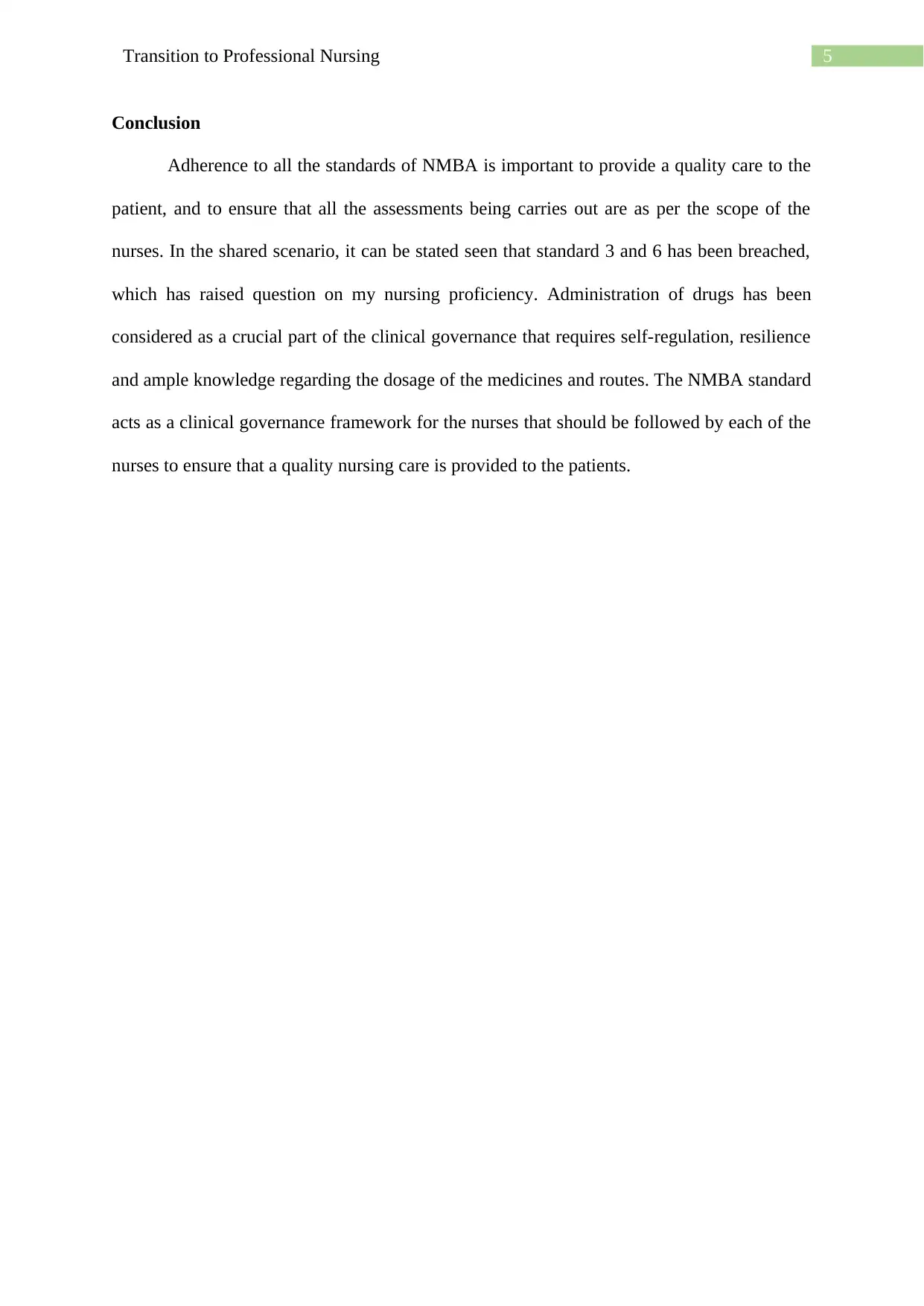
5Transition to Professional Nursing
Conclusion
Adherence to all the standards of NMBA is important to provide a quality care to the
patient, and to ensure that all the assessments being carries out are as per the scope of the
nurses. In the shared scenario, it can be stated seen that standard 3 and 6 has been breached,
which has raised question on my nursing proficiency. Administration of drugs has been
considered as a crucial part of the clinical governance that requires self-regulation, resilience
and ample knowledge regarding the dosage of the medicines and routes. The NMBA standard
acts as a clinical governance framework for the nurses that should be followed by each of the
nurses to ensure that a quality nursing care is provided to the patients.
Conclusion
Adherence to all the standards of NMBA is important to provide a quality care to the
patient, and to ensure that all the assessments being carries out are as per the scope of the
nurses. In the shared scenario, it can be stated seen that standard 3 and 6 has been breached,
which has raised question on my nursing proficiency. Administration of drugs has been
considered as a crucial part of the clinical governance that requires self-regulation, resilience
and ample knowledge regarding the dosage of the medicines and routes. The NMBA standard
acts as a clinical governance framework for the nurses that should be followed by each of the
nurses to ensure that a quality nursing care is provided to the patients.
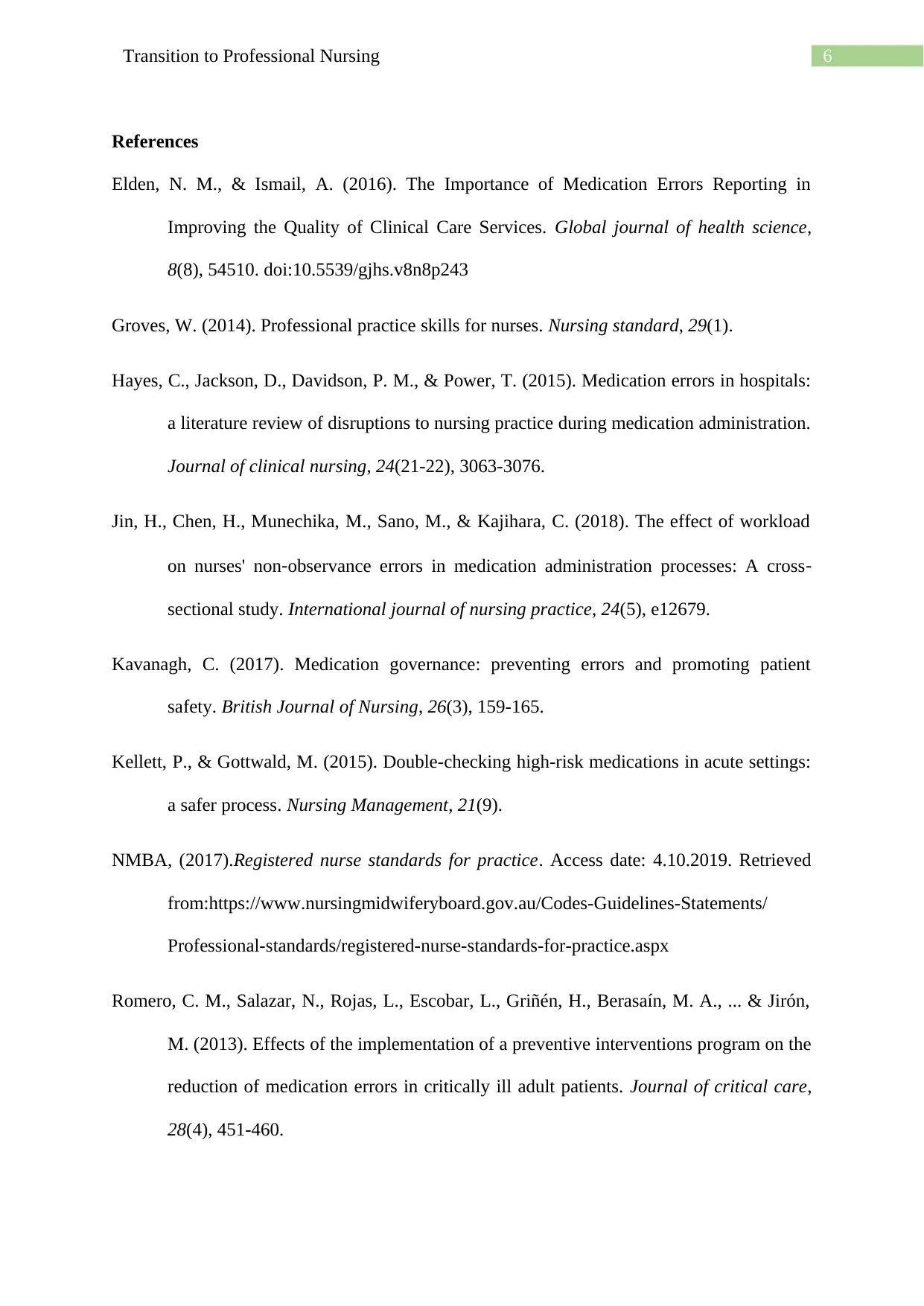
6Transition to Professional Nursing
References
Elden, N. M., & Ismail, A. (2016). The Importance of Medication Errors Reporting in
Improving the Quality of Clinical Care Services. Global journal of health science,
8(8), 54510. doi:10.5539/gjhs.v8n8p243
Groves, W. (2014). Professional practice skills for nurses. Nursing standard, 29(1).
Hayes, C., Jackson, D., Davidson, P. M., & Power, T. (2015). Medication errors in hospitals:
a literature review of disruptions to nursing practice during medication administration.
Journal of clinical nursing, 24(21-22), 3063-3076.
Jin, H., Chen, H., Munechika, M., Sano, M., & Kajihara, C. (2018). The effect of workload
on nurses' non‐observance errors in medication administration processes: A cross‐
sectional study. International journal of nursing practice, 24(5), e12679.
Kavanagh, C. (2017). Medication governance: preventing errors and promoting patient
safety. British Journal of Nursing, 26(3), 159-165.
Kellett, P., & Gottwald, M. (2015). Double-checking high-risk medications in acute settings:
a safer process. Nursing Management, 21(9).
NMBA, (2017).Registered nurse standards for practice. Access date: 4.10.2019. Retrieved
from:https://www.nursingmidwiferyboard.gov.au/Codes-Guidelines-Statements/
Professional-standards/registered-nurse-standards-for-practice.aspx
Romero, C. M., Salazar, N., Rojas, L., Escobar, L., Griñén, H., Berasaín, M. A., ... & Jirón,
M. (2013). Effects of the implementation of a preventive interventions program on the
reduction of medication errors in critically ill adult patients. Journal of critical care,
28(4), 451-460.
References
Elden, N. M., & Ismail, A. (2016). The Importance of Medication Errors Reporting in
Improving the Quality of Clinical Care Services. Global journal of health science,
8(8), 54510. doi:10.5539/gjhs.v8n8p243
Groves, W. (2014). Professional practice skills for nurses. Nursing standard, 29(1).
Hayes, C., Jackson, D., Davidson, P. M., & Power, T. (2015). Medication errors in hospitals:
a literature review of disruptions to nursing practice during medication administration.
Journal of clinical nursing, 24(21-22), 3063-3076.
Jin, H., Chen, H., Munechika, M., Sano, M., & Kajihara, C. (2018). The effect of workload
on nurses' non‐observance errors in medication administration processes: A cross‐
sectional study. International journal of nursing practice, 24(5), e12679.
Kavanagh, C. (2017). Medication governance: preventing errors and promoting patient
safety. British Journal of Nursing, 26(3), 159-165.
Kellett, P., & Gottwald, M. (2015). Double-checking high-risk medications in acute settings:
a safer process. Nursing Management, 21(9).
NMBA, (2017).Registered nurse standards for practice. Access date: 4.10.2019. Retrieved
from:https://www.nursingmidwiferyboard.gov.au/Codes-Guidelines-Statements/
Professional-standards/registered-nurse-standards-for-practice.aspx
Romero, C. M., Salazar, N., Rojas, L., Escobar, L., Griñén, H., Berasaín, M. A., ... & Jirón,
M. (2013). Effects of the implementation of a preventive interventions program on the
reduction of medication errors in critically ill adult patients. Journal of critical care,
28(4), 451-460.
Paraphrase This Document
Need a fresh take? Get an instant paraphrase of this document with our AI Paraphraser
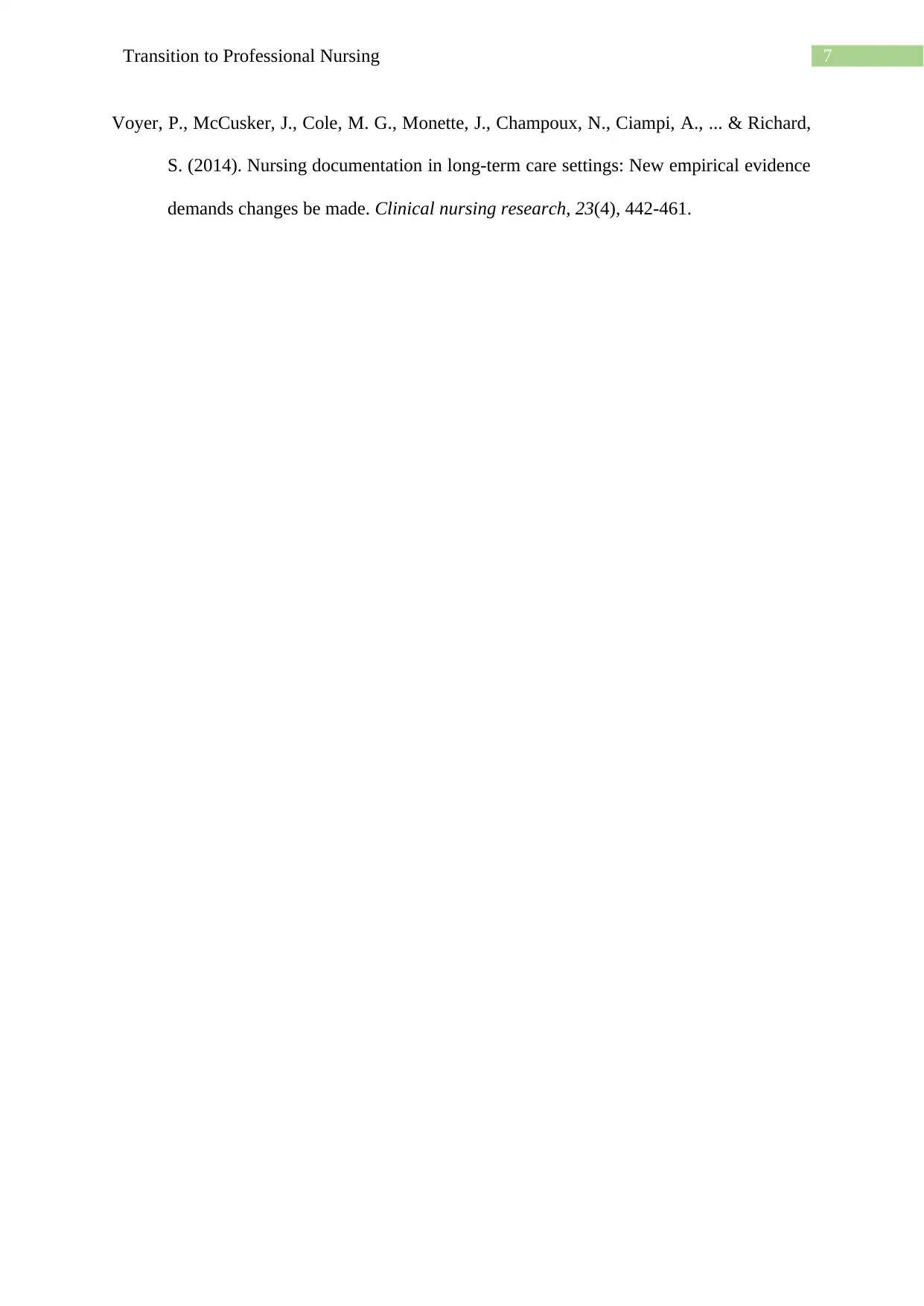
7Transition to Professional Nursing
Voyer, P., McCusker, J., Cole, M. G., Monette, J., Champoux, N., Ciampi, A., ... & Richard,
S. (2014). Nursing documentation in long-term care settings: New empirical evidence
demands changes be made. Clinical nursing research, 23(4), 442-461.
Voyer, P., McCusker, J., Cole, M. G., Monette, J., Champoux, N., Ciampi, A., ... & Richard,
S. (2014). Nursing documentation in long-term care settings: New empirical evidence
demands changes be made. Clinical nursing research, 23(4), 442-461.
1 out of 8
Related Documents
Your All-in-One AI-Powered Toolkit for Academic Success.
+13062052269
info@desklib.com
Available 24*7 on WhatsApp / Email
![[object Object]](/_next/static/media/star-bottom.7253800d.svg)
Unlock your academic potential
© 2024 | Zucol Services PVT LTD | All rights reserved.





